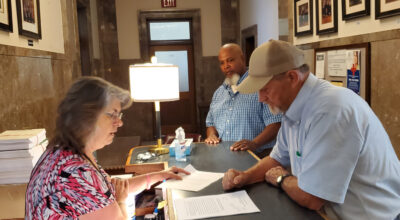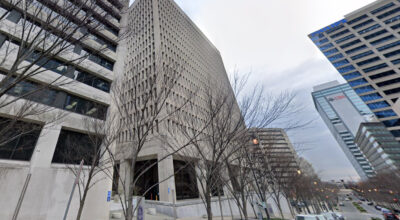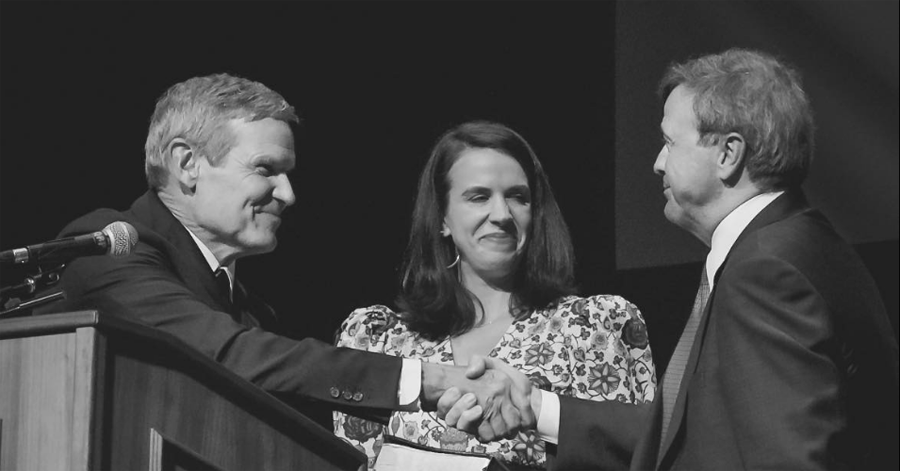
Gov. Lee swears in Dwight Tarwater as a supreme court justice on Tuesday. (Photo governor’s office)
CHATTANOOGA, Tenn., Saturday, Sept. 9, 2023 — The Tennessee supreme court, caught in the headlights of a damning petition vs. a sloppy internal tax structure, blinks at the very moment it names a chief justice and swears in another lawyer, Dwight Tarwater, as member of the court.
By David Tulis / NoogaRadio Network
The court mulls for nearly a month the petition of Arthur J. Hirsch of Lawrence County demanding an end to privilege taxes upon nonlawyer petitioners. On Friday Mr. Hirsch receives a ruling in the mail.
“Denied. Motion denied per curiam. No reasoning. No fact,” Mr. Hirsch says calling with the news. “I asked for it [legal reasoning] in big print. No reasons.”
“On Aug. 2, 2023, this court denied a motion filed by Arthur Jay Hirsch. On Aug. 8, 2023, Mr. Hirsch filed a motion for reconsideration and oral argument per Barger v. Brock, 535 S.W.2d 337 (Tenn. 1976). The court viewed this filing in the nature of a petition for rehearing pursuant to Tennessee rule at 39. Upon due consideration, the petition is denied. PER CURIAM.”
Mr. Hirsch, reading the order, says he does not ask for a rehearing, but reconsideration of his petition challenging the F$550 privilege tax on all Tennessee appeals, even criminal appeals that are by right. He put the name of Barger v. Brock in the title of his motion because that ruling shows the court is open to review of its internal methods, operations and customs.
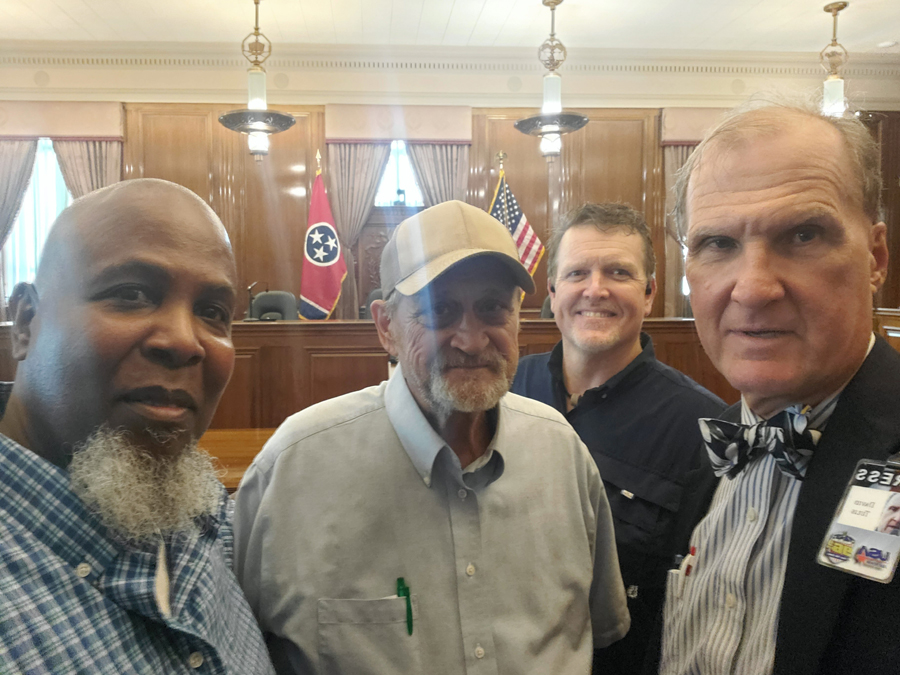
From left, truck driver Michael James, Arthur Jay Hirsch, NoogaRadio midstate bureau chief Christopher Sapp and David Tulis visit the supreme court’s main hearing chamber for the filing of Mr. Hirsch’s frontal attack on the supreme court’s skanky internal tax system that targets people not subject to privilege taxes. (Photo David Tulis)
Barger v. Brock is from Chattanooga and Hamilton County lawyers alleging a Supreme Court rule requiring annual registration of lawyers and payment of annual license fee was unconstitutional. The Supreme Court holds that Chancery Court had no right or power to declare a rule of the Supreme Court to be violative of State Constitution or to enjoin its enforcement.
The Hirsch challenge to the privilege tax arises from clear insight as to the nature of privilege taxation in Tennessee, privilege being one of two modes of taxation. The petition goes to the heart of other abuses, such as traffic enforcement that pretends that all users of the road are under privilege because they are using the roads commercially or for private profit and gain in a business the main place of business is the roadway itself.
In Barger the court makes a show of being open to criticism and reform.
This Court welcomes the continuing criticisms of its Rules. They never become final, and are always subject to change. We solicit advice and suggestions from the Bench and Bar for their improvement. When any individual deems any Rule of Court to be objectionable from any standpoint, it is his privilege to petition the Court for its elimination or modification. Indeed, it is the duty of the solicitors at the Bar of this Court to make suggestions and recommendations on the orderly administration of the appellate judicial process.
Barger v. Brock, 535 S.W.2d 337, 342 (Tenn. 1976)
Mr. Hirsch is petitioning his conviction of a “driving on suspended case” the state has been prosecuting nearly seven years, despite Hirsch’s record including a detailed review by the attorney general’s office indicating no record exists of his having applied for a Tennessee driver license.
“I haven’t had one blasted judge over seven years to put anything in writing in their decisions, even though I ask for it,” Mr. Hirsch says. “They just say, ‘Take it up on appeal if you don’t like it.’ Not one. The supreme court’s the same way. According to bar association rules and several cases, it says that the people, they basically have a right to know what the court is thinking. If I’m wrong, show me I’m wrong.”
A thin record makes a case difficult to appeal because the appellate judges have little to go on – other than Mr. Hirsch’s copious filings, motions and briefs.
Mr. Hirsch says initially he has little option but to appeal to the U.S. supreme court. “But I’m a little concerned about that,” and there is no way to make his a special case to get it “expedited.” Scotus gets 12 petitions a day. Lawyer-led paying parties are required to send 40 copies on expensive paper with strict format rules, while paupers are allowed to file 10 copies of the petition on regular typing paper.
‘I won’t let you down’
Knoxville attorney Tarwater is sworn in Tuesday. ““I will work hard and be fair. And I promise you, Governor, I will uphold the oath I just took. I won’t let you down, and I won’t let Tennessee down,” he says, according to a statement by AOC, administrator of the courts.
The legislature confirmed Mr. Tarwater in March, and his term began Sept. 1, filling the seat left by Sharon G. Lee.
Says Gov. Bill Lee, “I have said on many occasions that this may be the most important, if not one of the most important jobs, that a governor has. Justice is the cornerstone of the selection process. It’s the cornerstone for a position on the Supreme Court. I am confident Justice Tarwater is the right person for the job.”
“Dwight Tarwater has the integrity, the intellect, the work ethic, the compassion, and the old-fashioned common sense needed to be an excellent justice,” says the new chief justice, Holly Kirby. “He also has perhaps the most important quality — humility.”
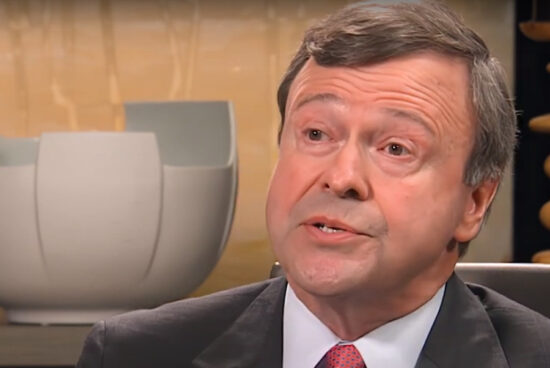
Dwight Tarwater gives a TV interview about his life and ideas.
Justice Kirby adds, “On most of the questions that we hear, the ruling of the Tennessee Supreme Court is the final word. There is no appeal, no higher authority. That’s why humility is so important. The type of power state Supreme Court Justices have must be tempered by humility.”
Says Kirby in a press statement about her election: “Tennessee has the finest judiciary in the country; our judges are dedicated public servants who serve with integrity. I am grateful for the opportunity to work with all of them to strengthen public confidence in our courts, access to justice for vulnerable citizens, and the rule of law in Tennessee.”
Over the next several years, the Supreme Court will oversee the largest investment in the technology infrastructure of the judiciary in the state’s history. “Going forward,” Justice Kirby said, “smart technology for the judicial system will be crucial for our judges to do their jobs, to extract needed data for our State’s decision-makers, and for all Tennesseans to be able to access our courts.”
Not only is Mr. Hirsch in the deepest poverty as a private businessman, he has looked carefully at Tennessee law and determined that the privilege tax to get a traffic case into the appellate court is due only from lawyers.
Mr. Hirsch is not an attorney. He handles his own litigation.
Since bar-licensed attorneys derive personal financial benefit and profit from the privileged use of the publicly funded court system, Hirsch says, “it is statutorally correct that all licensed attorneys be those subject to and liable for paying the required court litigation privilege taxes and administrative fees. *** It is by law incorrect and unjust for the unlicensed general public to be forced to pay the privilege tax in order to exercise their inviolable constitutionally secured rights.”
Hirsch alleges that the misapplication of the Supreme Court rule is patently unconstitutional, citing, “Where rights secured by the Constitution are involved, there can be no rule making or legislation which would abrogate them.” Miranda v. Arizona, 384 U.S. 436, 491 (1966).
Court goes weird when challenged
The closer a case gets to what is fairly called the power structure in Tennessee, the less likely will the court be to obey the constitution and respect statute as written.

Holly Kirby, supreme court top justice.
➤ The most important court case in state history, filed by the state itself against Gov. Lee and Hamilton County health administrator Rebecca Barnes, highlights the problem of an unjust and political court. The justices refused to hear State ex rel Tulis v. Lee after rejecting two rounds of motions for recusal, the second motion targeting the five justices as bar members with affinity to American Bar Association green policy. The first round targeted chief justice Roger Page for having me arrested for my work as a reporter. The suit insisted on obedience to the key epidemic law at T.C.A. 68-5-104, requiring determination of the agent of contagion. The court participated in the abrogation of the constitution and overthrow of the government, a coup that only two press platforms in Tennessee reported (TNtrafficticket and NoogaRadio Network 96.9 FM).
➤ The new case Tulis v. department of revenue seeks to overthrow criminal activity led by David Gerreguano, commissioner, who is abusing the public by enforcing the Tennessee financial responsibility act of 1977 as if it were the Tennessee mandatory insurance act of 1977, which it isn’t. I will appeal it to Scotus, as necessary, to obtain compliance with state law at T.C.A. 55-12-101 et seq.
The supreme court will be empowered to consider the distinction in the law between travel and traffic, between communication and the exercise of rights on one hand, and trucking, shipping and transportation on the other. Criminal oppression by cities, counties, troopers, courts and the branches of government uniformly uphold the legal fiction that all travel must be commercial; otherwise, it is criminal.
The first pre-hearing conference took place by phone Thursday among hearing officer Brad Buchanan and revenue attorney Camille Cline. I am demanding Mr. Buchanan recuse since I am challenging the commissioner as a lawbreaker.
In law and numerous court cases, Tennessee is described as an after-accident state, meaning that a motorist involved in a qualifying traffic accident must show proof of financial responsibility in a short time window, dealing with the commissioner safety improving that he is financially responsible for his part in the mishap.
Instead, the state administration, serving the insurance industry with 350 partners, forces the traveling public, and all drivers and operators of motor vehicles into insurance contracts with these partners, netting the industry $2.6 billion yearly in premiums, and 25,000 criminal convictions per year for “failure to show insurance.”
Given its interest in maintaining corporate capture of government, as it did for Covid-19, the court will likely weasel its way out of justice in my new case. Gov. Lee will perform Justice Kirby’s ceremonial investiture at 9 a.m. on Oct. 4 in the Old Supreme Court Chamber on the first floor of the Tennessee State Capitol.
